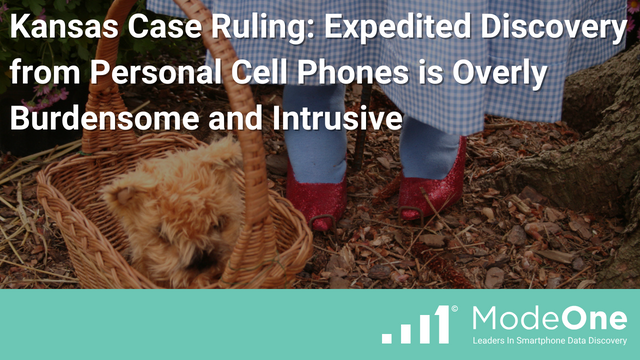A magistrate judge in Kansas found good cause for expedited discovery and that full forensic imaging of computers and storage devices was “reasonable and proportional” to the needs of a case alleging intellectual property theft. However, the judge also determined that full imaging of personal cell phones used at work was “unduly burdensome and intrusive,” given the disproportionate amount of personal information irrelevant to the case that was likely stored on the phones.
Industry thought leader Doug Austin reported on Ainstein AI, Inc. v. ADAC Plastics, Inc., No. 23-2166-DDC-TJJ (D. Kan. May 19, 2023), wherein the plaintiff, Ainstein AI, formed a joint venture with the defendant, ADAC Plastics, to manufacture radar-based sensing products to use in the international automotive industry. When the relationship deteriorated, Ainstein brought this action alleging that ADAC misappropriated trade secrets under state and federal law, engaged in unfair competition, and breached contractual non-competition and confidentiality agreements and the duty of good faith and fair dealing.
Ainstein discovered that ADAC’s employees downloaded 79,467 files from a Google Drive during the joint venture and submitted an Emergency Motion for Preliminary Injunction to enjoin the defendant from retaining and using the “mass-downloaded trade secrets,” among other things. Based on the motion, Ainstein moved for expedited discovery before the parties conferred according to Rule 26(f) of the Federal Rules of Civil Procedure (FRCP). Ainstein requested a forensic examination of ADAC’s employees’ computers, storage devices, and personal cell phones to preserve evidence of the defendant’s alleged misappropriation of the plaintiff’s trade secrets.
The court acknowledged that good cause frequently exists in infringement claims and unfair competition cases and found that early discovery was reasonable and proportional to the needs of the case where discovery concerned the downloaded data files and how the defendant used them. However, the court limited the expedited discovery to the employees’ computers and storage devices, excluding their personal cell phones.
Although the court agreed that the employees’ cell phones may have been used for various work activities, it wasn’t clear to what extent they were used for business purposes. The court opined, “Personal cell phones likely contain a tremendous volume of information, including text messages, email messages, phone logs, and photographs that are not relevant to the claims.” Thus, the court found Ainstein’s request to image the employees’ smartphones “overly broad, unduly burdensome, and unduly intrusive, given the disproportionate amount of personal information totally irrelevant to the lawsuit likely on those individuals’ cell phones.”
Suffice it to say, there is an awareness and information gap within the nation’s court system and law firm ecosystem about the fact that new technology exists TODAY that would alleviate valid concerns about privacy and difficulty in collecting relevant data only from mobile phones. Had Ainstein been aware of and informed the court of a new technology that exists today that would deliver fast and efficient target collection of smartphone data specific to the case in hand while ignoring irrelevant personal information, the court may have reacted the same way Dorothy did in the 1939 movie classic, “The Wizard of Oz,” when she told her dog, Toto, “I’ve a feeling we’re not in Kansas anymore.” Indeed, this game-changing solution is available in Kansas and every other location worldwide.
ModeOne’s patented SaaS framework remotely collects data from Apple and Android mobile devices for litigation, compliance, and investigation purposes and can limit data acquisition to the scope of discovery for review. Its revolutionary technology sets it apart from other solutions and service providers who forensically image or collect ALL smartphone data and claim to review what is relevant to a matter using search parameters and date-range filters. ModeOne uses a remote, targeted smartphone collection technology and processes that recognize an individual’s privacy interests in her/his smartphone and generally the right to control personal data.
The court assumed that the overwhelming amount of personal information irrelevant to the lawsuit was disproportionate to any information relevant to the case. Also, the court observed that cell phone users rely on their phones for communication and other needs to produce their phones to a third party for an unspecified amount of time. However, ModeOne collects targeted data within the scope of a matter and can do it while the smartphone remains in the control of the custodian. In fact, the custodian can continue to use the phone during the collection. This technology stands to disrupt how courts analyze one factor of proportionality, namely, whether the burden or expense of the proposed discovery outweighs its likely benefit (Fed. R. Civ. P. 26(b)(1)). ModeOne’s technology removes the burden and the expense of smartphone discovery.
When the FRCP Advisory Committee restored the proportionality calculation to Rule 26(b)(1), it did not change the court’s and the parties’ existing responsibilities to consider proportionality. The change did not place on the party seeking discovery the burden of addressing all proportionality considerations. The committee urged that courts and parties should be willing to consider the opportunities for reducing the burden or expense of discovery as reliable means of searching electronically stored information become available.”
ModeOne’s SaaS solution enables a forensics technician to define the date ranges and data sources relevant to a matter. Its framework gains remote access to the smartphone only after receiving the custodian’s advance permission, locates the relevant data stored on the phone, and securely transfers it to ModeOne’s cloud storage on Amazon Web Services (AWS), where it is encrypted and stored. Attorneys can then use ModeOne’s web-based user interface to search and review relevant messages in a threaded format and download selected notes in a format compatible with any electronic discovery review platform.
